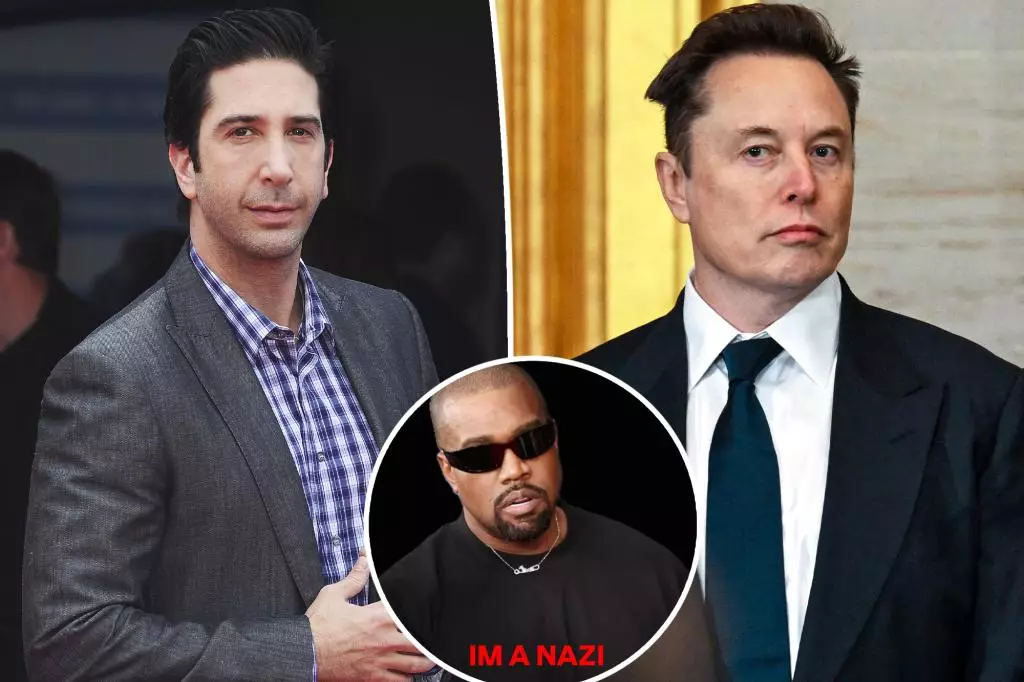In today’s digital age, social media platforms have become the modern town square where ideas are exchanged, discussions are held, and unfortunately, prejudices are amplified. The recent actions of celebrities, particularly Kanye West—now known as Ye—reveal the alarming trend of hate speech permeating these public arenas. His incendiary remarks towards Jewish individuals have elicited a strong response from notable figures like David Schwimmer, highlighting a critical intersection between celebrity influence and societal responsibility.
Schwimmer’s recent Instagram post calling for the removal of Kanye West from the social media platform X (formerly Twitter) is not merely an isolated incident; it represents a broader plea for accountability. Amidst West’s antisemitic tweets, Schwimmer categorized the rapper’s behavior as “deranged bigotry,” pointing to the platform’s failure to act against such harmful rhetoric. The actor’s appeal emphasizes that allowing individuals with vast followings to spread hateful ideologies leads to real-life consequences, including violence and marginalization of entire communities.
Hate speech is not just a series of offensive statements; it can translate into tangible harm. Studies have shown that when influential figures promote harmful narratives, their followers are more likely to adopt similar views, leading to a cycle of discrimination and violence. Schwimmer’s plea for Musk to reconsider West’s presence on the platform serves as a crucial reminder that silence in the face of hate can be interpreted as consent to its spread.
West’s substantial following—32.7 million on X—is both a testament to his celebrity status and a cause for concern. The sheer number of individuals influenced by his words raises alarming questions about the responsibility of social media platforms in monitoring and regulating hateful content. Schwimmer’s assertion that West’s following is “twice as many people than the number of Jews in existence” illustrates the disproportionate impact that public figures can have on the perception of entire communities.
The situation calls into question the role of social media executives in curbing hate speech. By providing a stage for individuals like West, platforms inadvertently endorse problematic ideologies. This begs the question: How much responsibility do social media companies have in protecting marginalized communities from the dangers posed by their most influential users? The answer seems clear; proactive measures must be taken to mitigate the dissemination of hate.
In Schwimmer’s passionate call to action, he highlights a fundamental issue: the lack of sufficient outrage surrounding such blatantly antisemitic comments. This indifference, he argues, constitutes complicity. The troubling reality is that many may scroll past hateful rhetoric without feeling compelled to act or speak up. Activism has often depended on public outcry, but the incessant barrage of misinformation and hate can lead to desensitization.
Schwimmer’s urgent request serves as a reminder that individuals must not only reject hate speech but also actively challenge it. This involves reporting offensive content, supporting policies that hold platforms accountable, and encouraging discourse that promotes understanding rather than division. Public figures, journalists, and everyday citizens play a pivotal role in amplifying positive narratives and standing against hate.
The rhetoric of figures like Kanye West cannot be dismissed as mere celebrity antics; it carries significant weight. The interplay between celebrity culture, social media, and public belief systems necessitates a collective responsibility to confront and combat hate speech. Schwimmer’s clarion call for action is not just an appeal to Elon Musk but a broader invitation to all of us to engage in meaningful dialogue against hate and prejudice. As consumers of social media, we must recognize our power and responsibility in shaping an inclusive and respectful discourse. Stamping out hate necessitates courage, vigilance, and a commitment to fostering a world where all communities can thrive without fear of discrimination or violence.
